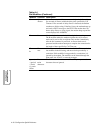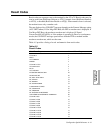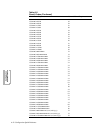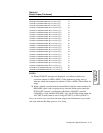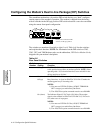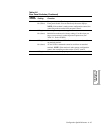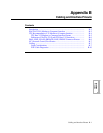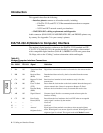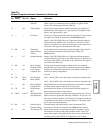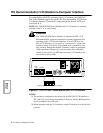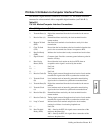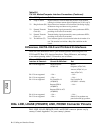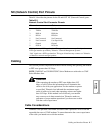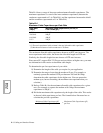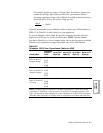
B-2 Cabling and Interface Pinouts
Interface
Pinouts
Introduction
This appendix describes the following:
• Interface pinouts common to all modem models, including:
— EIA/TIA 232-D, and ITU V.35 Recommendation modem-to-computer
interfaces
— NC IN and OUT network control port interfaces
• 326X/326X-SDC cabling requirements and diagnostics
Audio connector (DIAL LINE, LEASE/PRIVATE LINE, and PHONE) pinouts vary
by country. See Appendix C for your country's pinouts.
EIA/TIA 232-D (Modem to Computer) Interface
The modem’s digital interface conforms to the EIA/TIA 232-D standard and ITU
V.24, ITU V.28, and ISO 2110; the modem should be connected to a data terminal
with a compatible digital interface (Table B-1). NOTE: For DTE rates greater than
38.4 kbps, refer to the “Cabling” section to determine cables and lengths.
Table B-1.
Modem/Computer Interface Connections
Pin
EIA/TIA
232-D ITU V.24 Signal Definition
1 —— — Not used.
2 BA 103 Transmitted Data
(TXD)
Digital data transmitted from the local terminal to the remote modem.
3 BB 104 Received Data
(RXD)
Demodulated data received by the local terminal from the remote
modem.
4 CA 105 Request To Send
(RTS)
Sent from local terminal to local modem to ready it for data
transmission.
5 CB 106 Clear To Send
(CTS)
Passes from the local modem to the local terminal when the data port is
clear to transmit data. Occurs in response to Request To Send.
6 CC 107 Data Set Ready
(DSR)
Indicates the local modem is ready to transmit and receive data.
7 AB 102 Signal Ground Common signal. Provides a common ground reference point for
interface circuitry.
8 CF 109 Data Carrier
Detect (DCD)
Passed from the local modem to the local DTE when an acceptable
carrier signal is received by the modem.
9 —— — Not Used.
10 —— — Not Used.
11 —— Answer/
Originate Select
Signal passed from terminal to modem to select answer/originate
status. When signal is on, answer signal is selected. When signal is off,
originate signal is selected. This signal works with Mode=External.



